Nel cuore dello storico quartiere del Marais, le Haut Marais, tra la Bastiglia e Place de la République per la precisione, si trova uno dei negozi di moda e arredo più en vogue, per dirla alla francese, di Parigi. Merci, nato nel 2009 come iniziativa benefica, è la materializzazione in forma concentrata dell’anima del quartiere. Nel suo mix un po’ aristocratico, un po’ artistico, creativo e anche elegante, gourmet ma conviviale, Merci esprime lo spirito più autentico del Marais.
Marie-France Cohen, insieme con il marito Bernard, è riuscita a mettere in pratica una sua grande intuizione: creare sotto uno stesso tetto uno spazio che riunisse tutto il meglio del design, della moda e del cibo, un luogo che incredibilmente a Parigi mancava.
Il concetto di Merci è trasversale, in tutti i sensi. Concept store o fushion store che dir si voglia, vi si trova praticamente tutto quanto serve per la casa, per vestirci, per renderci più edotti, e possiamo anche mangiare. Dall’arredo di design con i pezzi storici affiancati alle ultime novità, al necessario per il giardino dei cittadini, i balconi e le terrazze, all’abbigliamento e i prodotti per la bellezza.
Ogni tre settimane Merci prepara un nuovo allestimento in una rotazione senza sosta di proposte, una chiave fondamentale della sua popolarità. Grandi classici, prodotti pratici, eccelse opere artigianali, nuovi talenti, che qui trovano l’occasione di emergere. La varietà continua di nomi e oggetti sorprendenti, un team efficientissimo e geniale alle spalle, sono il segreto del suo grande successo.
La sua attenzione all’ecosistema porta la Danimarca da Merci. Copenhagen, con le sue piste ciclabili, le energie alternative e un sistema scolastico tra i più avanzati, sono l’ispirazione per la mostra TAK, che in danese significa grazie, ossia Merci in francese. Per l’occasione Daniel Rozensztroch, direttore artistico di Merci, ha esposto la sua collezione privata di scatole di aringhe dal 1860 agli anni Cinquanta. Una testimonianza commovente dell’importanza che ha avuto questo cibo nella cultura nordeuropea.
Le scenografiche installazioni di Merci sono sempre grandi eventi a Parigi. Per festeggiare l’anniversario della Tolix, Merci ha creato una pila eccezionale di sedie alta i due piani dell’ingresso del negozio. La sedia A, inventata negli anni Trenta, era diventata immediatamente popolare perché moderna, robusta, impilabile e inossidabile. Era, ed è tutt’ora, perfetta per gli spazi all’aperto, dai bar alle famose piazze della pétanque (il gioco delle bocce in Francia) all’ombra dei platani.
Altra collaborazione importante è quella con Found Muji, noto in tutto il mondo per i suoi prodotti d’uso quotidiano. Per festeggiare l’inaugurazione del suo più grande flagship store europeo a Parigi, Muji ha chiesto a Merci di proporre una selezione di oggetti testimoni della qualità del design nella quotidianità francese. Oggetti sopravvissuti alla prova del tempo e riproposti in chiave moderna secondo la filosofia di Muji, umile e nobile allo stesso tempo.
Un’immagine semplice e piena di ricordi, molto diversa dalla Grande Cuisine.
Oltre al ristorante Cantine, due café, offrono ristoro. Il Used book café, con 10.000 libri usati da scoprire o riscoprire e, aperto su Boulevard Beaumarchais, il Cinéma Café dove, proiettati su una parete, i grandi classici del cinema fanno da sfondo silenzioso a una pausa.
